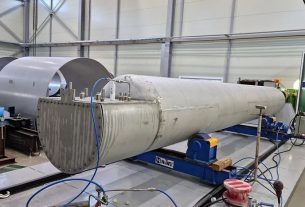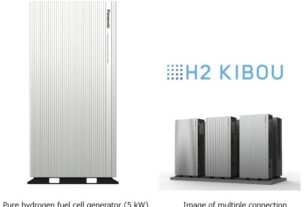Germany – The University of Bayreuth develops high-temperature electrolysis (HTEL) research as part of the Federal Ministry of Education and Research-funded hydrogen flagship programs (BMBF).
The H2Giga project aims to address Germany’s demand for green hydrogen through research, development, and industrial production of high-performance, low-cost electrolysers. The H2Giga project “HTs: HTEL Stacks – Ready for Gigawatt,” coordinated by the business Sunfire, is one of the seven “scale-up initiatives” under H2Giga. Over the course of nearly four years, the Chair of Ceramic Materials Engineering will receive funding totaling more than € 950,000 as part of this collaborative effort.
Addressing hydrogen demand
Green hydrogen can be carried over vast distances while storing enormous amounts of sustainably produced energy. As a result, it will be critical to our future energy supply. It is already expected that future consumption in Germany would amount to several hundred million tonnes per year. To address this demand, efficient, resilient, and cost-effective electrolysers that split water molecules using electrical energy derived from renewable sources are required. The electrolysers must be industrially mass-produced and capable of meeting the European Union’s hydrogen strategy target of 40 gigatonnes of electrolysis capacity by 2030.
High-temperature electrolysis (HTEL) has proven to be a particularly promising method for green hydrogen production. As electrolysers, HTEL cells connected in series, known as HTEL stacks, are used. However, significant research and development efforts are still required for the energy industry to have access to large-scale HTEL cells and stacks in the near future. These initiatives include service life, material costs, efficiency, new stack manufacturing technologies, and their usage for large-scale hydrogen production.
HTs: HTEL Stacks – Ready for Gigawatt
This is where the H2Giga project “HTs: HTEL Stacks – Ready for Gigawatt” comes into play. The University of Bayreuth’s Chair of Ceramic Materials Engineering is in charge of critical research and development in this collaborative effort. Microstructure and thermomechanical features of both new and existing electrolyser cells will be examined. It is critical that the cell strength is maintained at high temperatures of up to 850 degrees Celsius. Only by properly understanding the links between microstructure and thermomechanical characteristics will it be feasible to forecast ageing processes in cells and design solutions for greater longevity.
Light and scanning electron microscopy, X-ray diffraction, and non-destructive pulse excitation technology will be used in the future Bayreuth research. Mechanical properties on the ceramic thin films will be measured using a laser extensometer at temperatures up to 850 degrees Celsius via ring-on-ring tests and tensile testing.
This will be accomplished using the research group’s new, one-of-a-kind high-temperature universal testing machine, which was financed by the German Research Foundation (DFG) and the TechnologieAllianzOberfranken at the end of 2020. In addition to the experimental work, simulations of the service life of HTEL cells will be performed using the finite element approach. In the collaborative project “HTs: HTEL Stacks – Ready for Gigawatt,” the Chair of Ceramic Materials will engage with several partners from academia and industry, particularly on the industrial implementation of the HTEL stacks. Sunfire GmbH in Dresden is in charge of the overall organizational management of the collaborative project.




